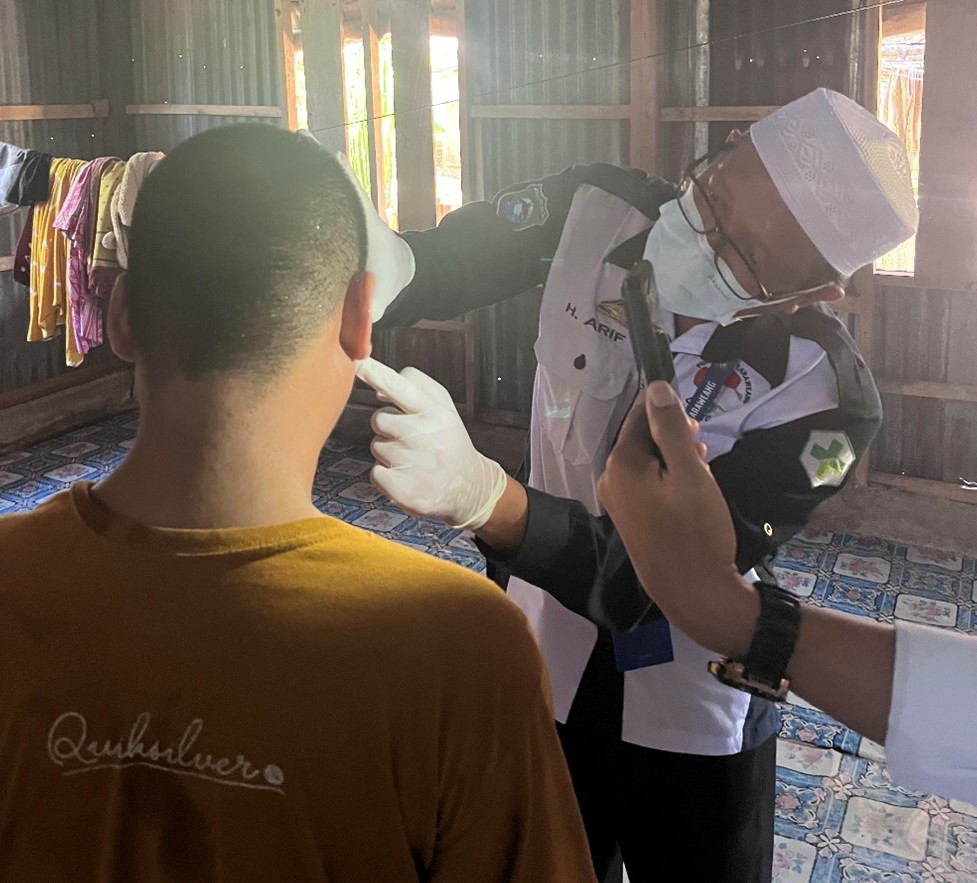The leprosy elimination programme in Indonesia encounters various obstacles, including delayed detection, stigma, limited awareness, and challenges in identifying close contacts. Post-exposure prophylaxis (PEP) plays a pivotal role in preventing disease transmission among leprosy patients' contacts. Administering a single dose of rifampicin helps eliminate the bacteria that eventually reduce the risk of transmission. PEP is crucial in breaking transmission chains, enabling early detection and treatment, preventing disabilities, and alleviating the burden on the health system. Aligned with the preventive strategy, PEP accelerates efforts towards leprosy elimination, supporting the global goal for 2030.
Indonesia successfully achieved the elimination of leprosy as a public health problem at the national level in 2000 and maintained the status until 2021 with a prevalence rate of 4.4 cases per 100,000 population. However, the consistent occurrence of new cases, including paediatric leprosy cases, remains a challenge, with decreasing case detection from 19,695 (2005) to 10,976 (2021). To sustain the elimination status and make further progress, Indonesia must enhance early case detection, raise awareness, reach high-risk populations, address stigma, and collaborate with international partners. By implementing targeted strategies, Indonesia can continue its journey towards a leprosy-free future and contribute to the global goal of eliminating leprosy transmission.
As part of the efforts to achieve the elimination status, MoH, WHO, and Netherlands Leprosy Relief (NLR) work collaboratively to implement post-exposure prophylaxis (PEP) in three endemic districts of South Sulawesi. The initiative commenced with programme sensitization and high-level advocacy meetings, during which key stakeholders emphasized the importance of leprosy elimination and obtained crucial support from relevant authorities at district level. Subsequently, careful preparations were undertaken in the designated areas, encompassing detailed logistical planning and allocation of resources to ensure a seamless and effective implementation process.

Using a cell-phone flashlight, Haji Arif, a leprosy worker at Puskesmas Taraweang, carefully examines a close contact of a leprosy patient. Photo credit: WHO/Achmad Naufal
Under the implementation of PEP, WHO and MoH, with local health authorities, administered of single dose of rifampicin (chemoprophylaxis) that adhered to standardized PEP guidelines as stated in the Health Minister’s Decree. The PEP strategy was adjusted to suit the conditions prevailing in each endemic district. Depending on the context, the approach varied, encompassing blanket or mini-blanket distribution—providing the single dose rifampicin to the entire population living in the area— and/or targeted contact strategies. PEP activities also provided an opportunity to find previously unreported leprosy cases and provide treatment.
The PEP started with outreach efforts targeting potential groups, followed by a workshop involving heads of Puskesmas, Leprosy Officers, and health promotion personnel in the Puskesmas. The Director of Communicable Diseases and Prevention of MoH also strongly advocated for the PEP programme. Consequently, local officials from provincial and districts level welcomed the PEP. Another integral facet of the programme was the distribution and the administration of leprosy preventive chemotherapy medication. The medication was administered by Leprosy Puskesmas officers, health promotion staff, and community groups through house-to-house visits. Prior to dispensing the preventive medicine, thorough counselling was provided, and individuals were examined for leprosy cardinal signs. Eligible individuals received a single dose of rifampicin, while confirmed leprosy cases were treated according to protocol with a multi-drug therapy (MDT) regimen.
WHO mobilized financial resources and provided technical assistances in finalizing the protocol and monitoring the progress. The medicine is provided free-of-charge by the MoH. The concerted efforts and dedication of all stakeholders involved in province and district health offices have yielded promising outcomes in the implementation of PEP in the targeted area. Overall, more than 95% of the targeted individuals have received the single-dose rifampicin in all three districts— 13,536 out of 14,145 individuals. The treatment coverage in Bulukumba and Pangkajene dan Kepulauan districts exceeded 100%, indicating the high participation and involvement of community member in these two districts. Meanwhile, in Selayar District, PEP was implemented with a blanket approach in three islands: Bonerate, Komba-Komba, and Lambego Islands, with approximately 80% coverage.
Additionally, field activities led to the detection of 92 new leprosy cases, and treatment was provided immediately to prevent disability. Early detection of leprosy cases and timely administration of rifampicin to close contacts have played a crucial role in breaking the transmission chain and halting the disease's progression. This collaborative strategy has not only contributed to reducing leprosy prevalence but has also bolstered the overall health system's capabilities and community engagement in leprosy control efforts, driving towards a future free from leprosy in the region.
“The choice to introduce PEP in our district has been a significant milestone in our fight against leprosy and in improving the health and well-being of our community. Your invaluable support and cooperation have been crucial in ensuring the successful implementation of this vital programme. We eagerly anticipate ongoing collaboration and advancements as we jointly strive for a leprosy-free future in our area,” said Hj. Herlina, Head of Pangkajene dan Kepulauan DHO.
PEP is a crucial early step for leprosy to prevent transmission, promote early detection, and contribute to the national leprosy elimination goal. By administering a single dose of rifampicin to eligible contacts, PEP reduces the risk of developing active leprosy and helps break the transmission chain within communities. Additionally, the programme raises public awareness, reduces stigma, strengthens healthcare systems, and demonstrates a collaborative effort towards achieving a leprosy-free future for Indonesia.
Expansion of PEP for leprosy in Indonesia comprises scaling up implementation to high-burden areas, building capacity of healthcare workers, strengthening surveillance and monitoring, enhancing community engagement and awareness, promoting research and innovation, advocating for resources, fostering collaboration with partners like NLR, and conducting regular reviews. By executing these strategies, WHO aims to eliminate leprosy transmission, ultimately creating a zero-leprosy future for Indonesia.
This activity was supported by Sasakawa Health Foundation
Written by Achmad Naufal Azhari, National Professional Officer for Neglected Tropical Diseases, WHO Indonesia.
